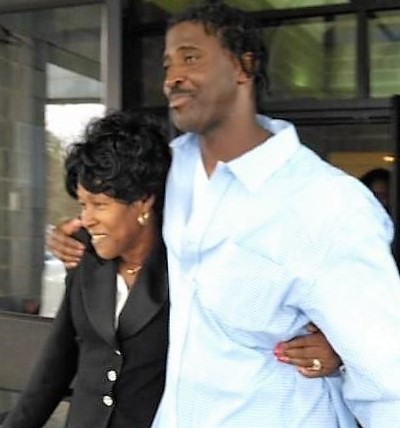 Jimmie Gardner (Photo WCHS TV) On May 16, 1987, a man broke into the home of 82-year-old Bethel Ferrell in the Kanawha City section of Charleston, West Virginia. The man physically assaulted Ferrell and sexually assaulted Ferrell’s 60-year-old daughter, Wilma Galati.
The women described their attacker as a black man with a light complexion.
On July 24, 1987, Lillian Ruckman was sexually assaulted in her home in Kanawha City. She also said her attacker was a black man and police believed the attacks were committed by the same person.
The investigation of the two crimes involved interviews with more than 100 potential suspects, including black baseball players for the Charleston Wheelers, whose stadium was located in Kanawha City. One of the players interviewed was 20-year-old Jimmie Gardner, a pitcher for the Wheelers and a promising prospect for the Chicago Cubs. He was fingerprinted and released.
In 1989, Gardner was arrested in Florida and was found in possession of a gun. A check of his fingerprints linked him to a fingerprint found on a vase in the Ferrell home, and he was brought back to Kanawha County.
Fred Zain, the chief blood analyst for the state of West Virginia, analyzed biological evidence from both sexual assaults in 1987 and concluded that Gardner could not be excluded as the rapist in either attack.
Gardner went to trial in Kanawha County Circuit Court in January 1990. None of the women identified him as their attacker. All three said their attacker was a black man with a light complexion. Gardner was black, but he had a very dark complexion. Ruckman had identified a man named Gary Hatchett as her attacker after viewing him in a photographic lineup.
West Virginia State Police lieutenant David Shumate testified that Gardner’s fingerprint matched a fingerprint impression found on a vase in Ferrell’s home, although there were discrepancies about which finger left the impression—a thumb or an index finger.
Zain testified that seminal fluid and sperm were identified in Galati’s rape kit and that Gardner could not be excluded as the source of the seminal fluid—even though his laboratory analysis had definitively excluded Gardner. The lab reports, which were not disclosed to the defense, identified the seminal fluid and semen as coming from a person with Type O blood and Gardner had Type A blood. Zain swore that Gardner was among the 0.18 percent of the male population that could have left the semen recovered from Ruckman.
Zain also testified that he also compared the genetic markers of Gary Hatchett to evidence in the Galati and Ruckman cases and he excluded Hatchett from both cases, even though in his underlying laboratory analysis, Hatchett was not excluded in the Galati case.
On February 1, 1990, the jury acquitted Gardner of the rape of Ruckman, but convicted him of the rape of Galati and the physical assault on Ferrell, and of robbery for taking $90 and a cassette player from their house. He was sentenced to 33 to 110 years in prison.
Three years later, in 1993, the Supreme Court of Appeals of West Virginia was confronted with a pattern of misconduct by Zain. In the years following Gardner’s trial, Zain was investigated and found to have a “long history of falsifying evidence in criminal prosecutions.” The Supreme Court of Appeals appointed retired state judge James Holliday to conduct an investigation of the serology division of the West Virginia State Police crime laboratory.
Ultimately, Judge Holliday concluded that Zain’s “pattern and practice of misconduct completely undermined the validity and reliability of any forensic work he performed or reported.” Holliday said that “as a matter of law, any testimonial or documentary evidence offered by Zain at any time in any criminal prosecution should be deemed invalid, unreliable, and inadmissible in determining whether to award a new trial in any subsequent habeas corpus proceeding.”
In 1989, Zain had gone on to do similar work in Bexar County in Texas, calling into question many cases in that state as well. Zain was fired by Bexar officials in 1993 and later indicted for fraud; he died of cancer in 2002 while awaiting trial.
The West Virginia Supreme Court of Appeals set forth the standards of review for resolving claims based on Zain’s fraudulent testimony. Gardner sought to vacate his convictions by filing a state law petition for a writ of habeas corpus on November 16, 1993, and pursuing it “diligently and persistently,” but he was unsuccessful for decades.
Finally, in July 2012, Gardner filed a federal petition for a writ of habeas corpus. In March 2016, U.S. District Judge Joseph Goodwin found that the West Virginia state courts had “inexplicably allowed his (state) habeas petition to languish for over two decades.” He issued the writ, vacated Gardner’s convictions and ordered that Gardner be given a new trial.
“The Circuit Court of Kanawha County has avoided a final ruling on the merits, despite being ordered to conduct a full evidentiary hearing multiple times” by the appeals court, Judge Goodwin declared. “Gardner has been in legal purgatory.”
Judge Goodwin said he had “absolutely no doubt that Zain’s false testimony” resulted in “a complete miscarriage of justice.”
Gardner was released on bond on April 1, 2016. On September 7, 2016, the prosecution dismissed the charges.
In March 2017, his lawyer petitioned the West Virginia Court of Claims to pay “damages in an amount sufficient to fairly and reasonably compensate him for the injuries suffered based upon this wrongful arrest, wrongful conviction and incarceration. In September 2017, Gardner filed a federal civil rights lawsuit seeking damages for his wrongful conviction. The city of Charleston agreed to settle the case in March 2019 for $175,000. In 2021, Kanawaha County and the state of West Virginia agreed to settle the remainder of the lawsuit for $3 million.
– Maurice Possley
|